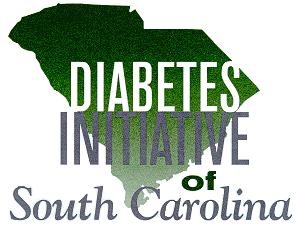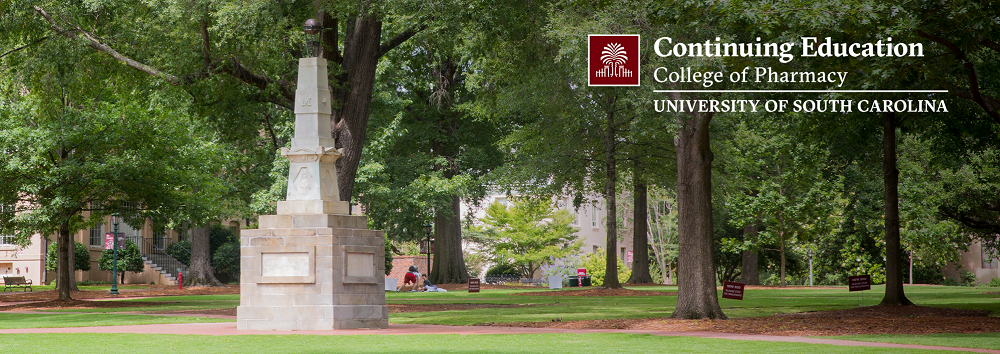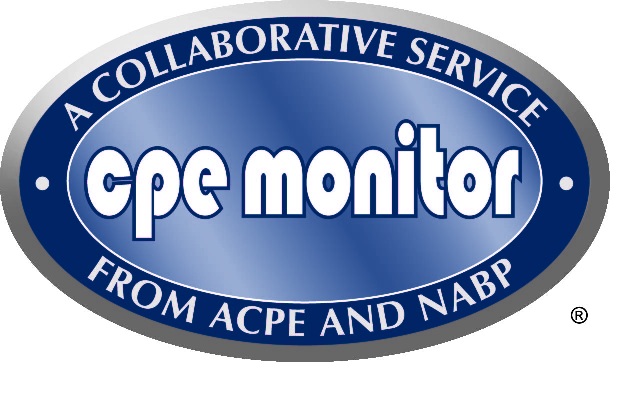
• Discuss three acute complications of diabetes mellitus (DM) with treatment modalities.
• Explain diabetes management in pregnancy.
• Identify principles of glucose monitoring.
• Discuss principles of diabetes mellitus (DM) management in childhood through adolescence.
• Analyze Medical Nutrition Therapy (MNT) as an approach to the non-pharmacological management of diabetes mellitus (DM).
• Apply the pharmacological treatment of diabetes to case studies.
Date: Feb 2, 2019 07:30 AM - 04:00 AM
CE Hours
CE Units
Activity Type
- Knowledge
Target Audience(s)
- Pharmacists
Accreditation(s)

|
The University of South Carolina College of Pharmacy is accredited by the Accreditation Council for Pharmacy Education as a provider of continuing pharmacy education.
|
Co-Sponsor(s)
Requirements for CE Credit
1. Review the pathogenesis of diabetes mellitus (DM).
2. Describe and differentiate Type 1 and Type 2 diabetes.
3. State diagnostic criteria.
Speaker(s)/Author(s)
|
Harsha Karanchi, MD
|
Activity Number
0062-9999-19-015-L01-PCE Hours
1. Discuss three acute complications of diabetes mellitus (DM) with treatment modalities.
2. Summarize clinical findings, management and complications of DKA, HHS and hypoglycemia.
3. Recognize the similarities and differences between DKA and HHS.
4. Define prevention strategies for hypoglycemia in diabetes.
Speaker(s)/Author(s)
|
Katherine Lewis, MD, MSCR
|
Activity Number
0062-9999-19-016-L01-PCE Hours
1. Explain diabetes management in pregnancy.
2. Describe the metabolism of normal pregnancy and the alterations that occur in overt and gestational diabetes.
3. Describe the diagnostic criteria and screening recommended by the ADA.
4. Describe potential maternal and fetal complications.
5. Summarize treatment options in GDM.
Speaker(s)/Author(s)
|
Christopher Goodier, MD
|
Activity Number
0062-9999-19-017-L01-PCE Hours
1. Identify principles of glucose monitoring.
2. Discuss self-management blood glucose monitoring (SMBG) and continuous glucose monitoring (CGM).
3. Discuss insulin pumps and integration of continuous glucose monitoring.
Speaker(s)/Author(s)
|
Jennifer McCrudden, MSN, FNP-C, CDE
|
Activity Number
0062-9999-19-018-L01-PCE Hours
1. Discuss principles of diabetes mellitus (DM) management in childhood through adolescence.
2. State goals for HgA1C and blood glucose levels for children/teens with diabetes.
3. State common emergencies related to children/teens with diabetes.
4. Recognize developmental stages of children/teens as they related to managing diabetes.
5. Review types of insulin pumps and continuous glucose monitoring utilized for glucose management with children and teens.
Speaker(s)/Author(s)
|
Heather Dolan, BSN, RN, CDE
|
|
|
Sharon Schwarz, APRN, MSN, CDE
|
Activity Number
0062-9999-19-019-L01-PCE Hours
1. Analyze Medical Nutrition Therapy (MNT) as an approach to the non-pharmacological management of diabetes mellitus (DM).
2. Review recommendations for Medical Nutrition Therapy from the American Diabetes Association and Academy of Nutrition and Dietetics.
3. Review strategies to aid patients with diabetes in controlling their BG levels with diet.
4. Recall tips to help create a realistic and individualized nutrition plan for patients.
5. Review the current trends in nutrition affecting counseling.
Speaker(s)/Author(s)
|
Sarah Forbes, MS, RD, CDE, BC-ADM
|
Activity Number
0062-9999-19-020-L01-PCE Hours
1. Apply the pharmacological treatment of diabetes to case studies.
2. Describe the current 2018 ADA Standards of Medical Care for the diagnosis and management of diabetes mellitus.
3. Review the data on the newer FDA approved medications for the management of Type 2 diabetes.
4. Discuss the appropriate use of evidence-based and cost effective therapies in the management of patients with Type 2 DM.
Speaker(s)/Author(s)
|
C. Wayne Weart, PharmD, FASHP, FAPhA
|

